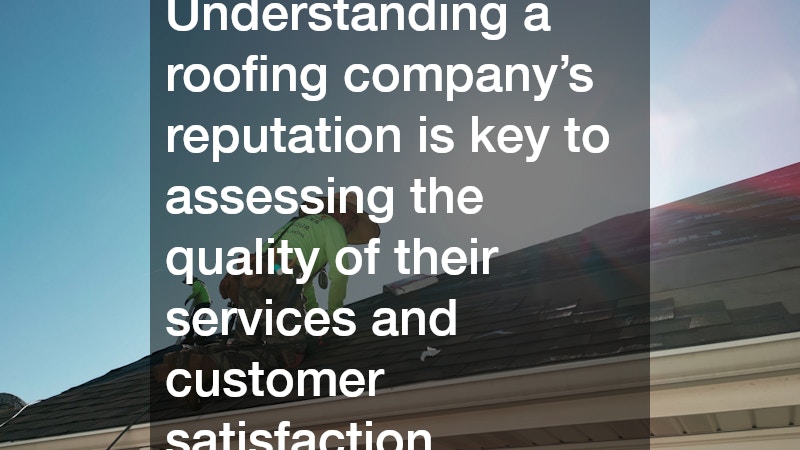
How to Choose the Right Roofing Company for Your Home
Introduction
Selecting the right roofing company is a decision that can significantly impact your home’s safety, durability, and overall value. A well-executed roofing project assures you of reduced future repair costs and the long-lasting integrity of your home. With so many options available, making the right choice may seem daunting, but understanding what to look for can simplify the process and help you ensure a quality outcome for your roof. This article guides you through the crucial aspects to consider, enabling a confident choice of a roofing company that will serve your needs effectively.
Choosing the right roofing company involves more than just picking a name from a directory or the lowest quote from a handful of options. It requires a thoughtful approach to ensure that the company has the necessary qualifications, a solid reputation, and offers good value for their pricing. This includes evaluating their experience, the quality of their prior projects, and their standing in the community. Making an informed decision about your roofing contractor will help protect your home from the elements and enhance its aesthetic appearance and market value.
In this article, we will explore essential elements such as licensing, reputation, experience, estimates, and the quality of materials and workmanship. We’ll also highlight the importance of clear communication and stellar customer service. By the end, you’ll be equipped with the knowledge needed to choose a reliable roofing partner, safeguarding your home’s future.
What Should I Look for in a Roofing Company?
Check for Proper Licensing and Insurance
Ensuring that the roofing company holds proper licensing and insurance is one of the most critical steps in your selection process. Licensing guarantees that the company adheres to state or local construction codes and regulations, which is crucial for the legal validation of their own practice and your property improvement. A licensed roofing contractor brings professionalism and adherence to mandatory quality and safety standards. Furthermore, they are more likely to stay updated with industry trends and training.
Insurance, on the other hand, provides protection against potential liabilities that can arise during the roofing process. This includes coverage for any injuries that the workers might suffer and any unintended damage to your property. Hiring an insured company reduces your risk of being held responsible for damage or injury, which could result in hefty legal and financial burdens.
The verification of a roofing contractor’s licenses and insurance is often a simple process. Contact the company directly and request copies of their insurance certificates and licensing information. You can also verify the provided information with local regulatory bodies and insurers. Ensure that both documents are current and valid. This diligence on your part ensures the legal, safe, and correct execution of your roofing project.
Research Company Reputation and Reviews
Understanding a roofing company’s reputation is key to assessing the quality of their services and customer satisfaction. Thanks to today’s digital age, conducting such research has never been easier. Start by looking at online reviews on platforms such as Google, Yelp, or Angie’s List. These platforms aggregate customer feedback and provide insights into a company’s reliability, workmanship, and customer service. Look for trends in feedback; if multiple reviews highlight the same issues, this may be indicative of a systemic problem.
In addition to reviews, consider asking the company for references or viewing their portfolio of completed projects. Speaking directly to previous clients can offer firsthand insights into their experiences, detailing how the company handled specific situations or challenges. Look for a company with testimonies that emphasize quality, punctuality, communication, and problem-solving capabilities.
Another valuable resource is consultation with trusted friends, family, or neighbors who have recently had roofing work done. Their experiences can provide personal recommendations or warnings, which can be instrumental in your decision-making process. Ultimately, examining these facets allows you to build a comprehensive picture of each company’s performance and reputation, leading you to a well-informed choice.
Evaluate Experience and Expertise
The experience and expertise of a roofing contractor are high-value characteristics to look for when considering a roofing company. Companies with a long tenure in the roofing business typically offer a proven track record of reliability and quality work. Experienced professionals have developed refined techniques and problem-solving strategies over time, making them adept at handling diverse situations and roofing materials.
Different roofing projects require different skills, whether it’s shingle replacement, slate roofing, or more complex installations like solar shingles or green roofs. Evaluating a company’s expertise ensures they have the specific skill set and knowledge to handle your particular roofing needs. Companies specializing in specific types of roofs often have deeper insights and more efficient processes for installation and maintenance.
When evaluating a company’s expertise, consider also its involvement in training programs and certification courses. This commitment to ongoing education indicates a dedication to the craft and advances in roofing technology. Companies investing in hone their skills and knowledge demonstrate a proactive approach to remaining at the forefront of the industry, offering greater value and reassurance to their clients.
How Do I Compare Roofing Estimates?
Request Detailed and Written Estimates
Requesting comprehensive, written estimates is vital in the roofing contractor selection process. These estimates offer transparency and clarity regarding the scope of work, materials needed, labor costs, timelines, and any additional fees. By obtaining several detailed quotes, you can effectively compare the offerings of different companies, ensuring you understand precisely what you’re paying for and protecting yourself against unexpected charges.
Written estimates serve as a foundation for your agreement with the roofing company. They protect you by setting clear expectations and becoming a legal document that you can refer to if discrepancies arise during the project. Be wary of contractors that only provide verbal quotes, as these can easily lead to misunderstandings or disputes over costs and obligations.
After receiving estimates, review them thoroughly and ask questions to clarify any uncertainties. Look for consistency across quotes regarding the quality of materials, labor hours, and the comprehensiveness of the warranty offered. Differences could indicate misunderstandings in project scope or potential areas for negotiation. Utilizing these documents strategically can ensure that you secure a fair deal without compromising on quality.
Assess Pricing and Payment Options
Once you receive and review written estimates, it’s time to assess the pricing and payment options available. Understanding not just the cost, but the value offered, is essential when comparing different contractors. The cheapest quote isn’t always the best choice, particularly if it comes at the expense of quality materials or workmanship.
Evaluate whether the price aligns with industry standards and the average cost for similar projects in your area. Consider what is included in the estimate beyond just the materials and labor: are there additional services, strong guarantees, or reassurances of post-installation support? It’s vital to balance initial costs with long-term benefits and warranties—which may mean opting for a slightly higher-priced contractor in exchange for peace of mind and durability.
Another important aspect is the payment terms provided. Some contractors require an upfront deposit, while others might offer financing options or staged payment plans, easing financial burdens. It’s crucial to understand these details thoroughly, ensuring they align with your financial situation. Clear, fair payment terms are indicative of a company’s commitment to transparency and customer satisfaction.
Analyze Warranties and Guarantees
A key component of evaluating roofing estimates is examining the warranties and guarantees offered. These assurances are critical for protecting your investment, covering issues that may arise post-installation. Most contractors offer warranties on both materials and workmanship, ensuring long-term protection and peace of mind.
Material warranties are generally offered by the manufacturers of the roofing products and can range from 20 years to a lifetime, depending on the type of material used. Ensure the products being installed are of high quality and come with substantial warranties, as this indicates trust in their durability and performance.
Workmanship warranties, offered by the contractor, are equally important as they cover the installation process and any errors that may occur. Compare the length and coverage of these warranties provided by different companies. A robust warranty is a strong signal of the contractor’s confidence in their work and commitment to customer satisfaction. Understanding and comparing these guarantees will provide added security that your roofing project achieves lasting success.
How Can I Ensure Quality Workmanship?
Ask About Roofing Materials and Their Suppliers
To ensure quality workmanship, inquiring about the roofing materials used and their suppliers is crucial. The longevity and performance of your roofing system heavily depend on the quality of the materials selected. Reputable roofing companies often establish solid relationships with trusted suppliers, ensuring the consistent availability of high-quality, certified materials.
Explore whether the contractor provides options for various materials, such as asphalt, metal, tile, or cedar. Each material has distinct advantages and potential drawbacks, influenced by factors like climate, aesthetics, and budget. Understanding these options and their durability ratings can help make an informed decision tailored to your home.
In addition to material quality, examine whether the suppliers are well-regarded within the industry. Leading manufacturers often offer training programs that help contractors maintain best practices in installation. Confirm that the roofing company sources materials from these reputable outlets, ensuring an outcome aligned with industry standards and best practices.
Request a Project Timeline and Schedule
Proper planning and time management are integral to ensuring a quality roofing job. Request a clear project timeline and schedule from the contractor, detailing each phase from preparation to completion. Understanding the estimated duration will assist you in coordinating other aspects of your life or maintenance plans, minimizing inconvenience.
A good contractor will develop a comprehensive schedule, considering variables such as weather conditions that may impact exterior work. They should provide buffers for potential delays and be transparent about what might affect timelines. Be wary of promises that seem overly ambitious or don’t account for potential risks.
By securing a solid timeline, you prevent projects from dragging on longer than necessary and maintain accountability for punctual completion. Regularly monitor progress against this schedule and discuss any deviations promptly. This ensures that you and your contractor are in sync and working towards the shared goal of efficient, quality project completion.
Seek Communication and Customer Service
Effective communication and excellent customer service are pivotal in ensuring a successful roof installation. Your roofing contractor should maintain open lines of communication, addressing your queries and providing updates on project progression, unforeseen issues, or changes promptly and clearly.
Good communication goes hand in hand with exceptional customer service. The way a company interacts with potential and current clients speaks volumes about their professionalism and commitment to client satisfaction. A contractor who responds quickly to inquiries, provides comprehensive answers, and resolves issues efficiently is likely to mirror this throughout the entire project.
Establishing expectations for communication from the outset sets a positive tone for your working relationship. Regular updates and checking in build trust, ensuring the project proceeds smoothly and to your satisfaction. Prioritize companies that value and exemplify these qualities, reflecting their dedication to excellence in both service and technical prowess.
Conclusion
To conclude, selecting the right roofing company necessitates thorough research and careful consideration of multiple facets, including licensing, reputation, experience, estimates, materials, and customer service. Making this informed choice ensures that the structural integrity and aesthetic of your home are maintained or enhanced, contributing to its longevity and value.
By verifying each company’s credentials, comparing estimates rigorously, and ensuring the use of high-quality materials, you safeguard your investment in your home. Companies with a strong track record and positive customer relations demonstrate a commitment to excellence, offering reassurance through clear communication and support throughout the installation process.
We encourage you to take your time when choosing the right contractor. Diligence in researching and comparing potential candidates furnishes you with clarity and confidence, enabling a rewarding and successful roofing project. With the right partner, your new or repaired roof will serve reliably, protecting you and your home for years to come.




